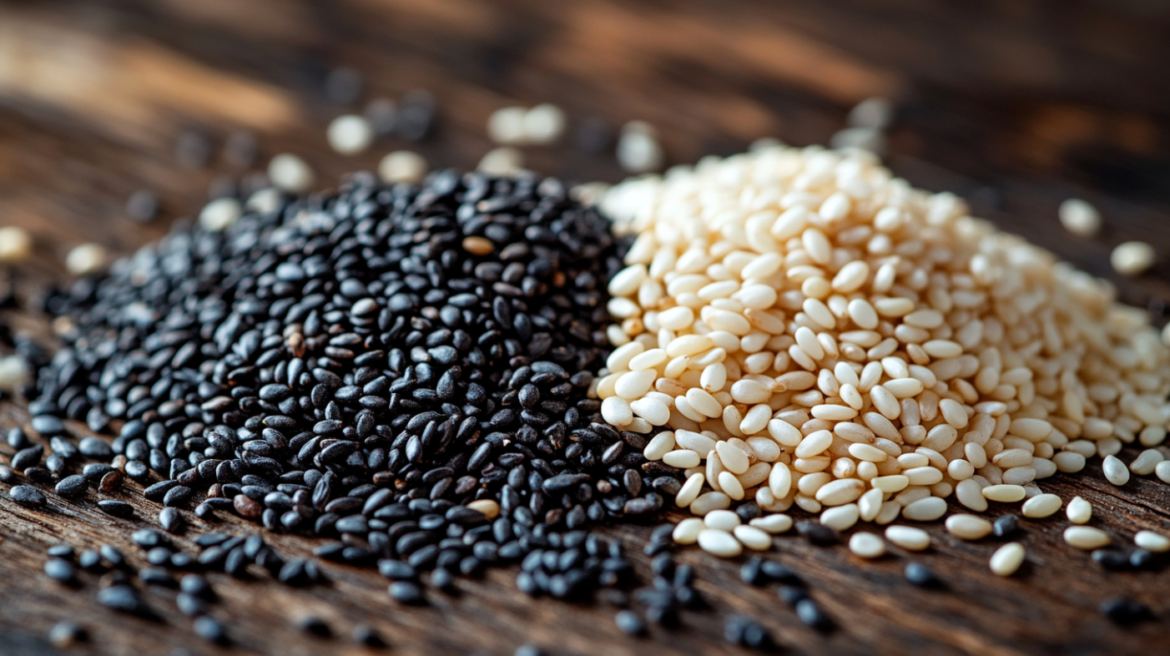The history of sesame as a remedy dates back approximately 3,600 years, to ancient Egypt, where it was mentioned in old papyri as a favored medicine. In ancient Babylon, women used a mixture of honey and sesame seeds (known today as halva) to maintain youth and beauty, while Roman soldiers consumed it to boost strength and energy. Moreover, sesame was one of the main plants cultivated in the famous hanging gardens of Babylon. The Babylonians used sesame seeds to make cakes, sweets, alcohol, and wine.
Sesame is a plant from the Pedaliaceae family, featuring white flowers with subtle bluish hues. It is primarily cultivated in India, Myanmar, China, Greece, and southern Italy. On the market, you can find both white sesame seeds and black sesame seeds, the latter having a more intense flavor and stronger antioxidant properties. Both varieties are highly valuable from a nutritional standpoint.
White or black sesame seeds are extremely rich in calcium, phosphorus, zinc, selenium, potassium, copper, and magnesium. They also contain B-complex vitamins (excluding vitamin B12 and folic acid), vitamin A, vitamin E, zinc, manganese, copper, and tryptophan. Furthermore, they offer oleic acid and linoleic acid (omega-3), both known for their protective effects on the heart and the cardiovascular system.
Sesame’s medicinal properties have been recognized since ancient times, with benefits noted in respiratory conditions, intestinal disorders, menstrual irregularities, urinary tract infections, and even in treating hemorrhoids. By promoting healthy digestion, sesame seeds also aid in nutrient absorption. Some sources suggest they may help with severe conditions such as neuroparalysis.
The copper in sesame seeds plays a crucial role in iron absorption, helping prevent and treat anemia. In addition, copper possesses anti-inflammatory properties, particularly benefiting bones and joints. Combined with manganese, which helps maintain bone density, copper can be especially helpful for individuals with rheumatoid arthritis.
Sesame seeds do not contain gluten, making them ideal for those with gluten intolerance or for anyone looking to maintain a gluten-free diet to support weight management.
Major Benefits of Sesame Seeds
- Heart Protection
Thanks to their high content of monounsaturated fats, sesame seeds help lower LDL (“bad”) cholesterol levels and cleanse blood vessels of fatty deposits. This reduces the risk of atherosclerosis and improves blood circulation. Sesame seeds also help regulate blood pressure, further safeguarding against various cardiovascular complications. - Cancer Prevention
Research indicates that sesame seeds contain powerful antioxidants that not only help keep skin youthful but may also reduce the risk of certain cancers. The key components are lignans, compounds that have been associated with lower risks of breast cancer and colon cancer. - Bone Strength
High levels of calcium and magnesium in sesame seeds offer remarkable benefits for bone health. They are recommended for preventing osteoporosis, particularly when the body is subjected to prolonged physical effort or suffers from low calcium absorption. - Fighting Chronic Fatigue
Sesame seeds are especially useful in cases of prolonged fatigue or during convalescence, due to their rich content of minerals and vitamins. For instance, just one tablespoon can supply enough nutrients to energize the body for several hours. - Memory Improvement
Containing lecithin—a substance vital for mental strength and physical balance—white or black sesame seeds support the nervous system and enhance memory. They can even prove beneficial in cases of depression. - Gum and Dental Health
Applying sesame oil to the gums with a gentle massage after brushing at night, over a period of about three months, can have a positive effect on oral health. - Burn Treatment
You can effectively treat burns using a paste made from finely ground sesame seeds and water. Apply this paste as a compress two or three times a day until the burns heal.
Other Notable Benefits
- Supports normal thyroid function and helps balance hormone levels during menopause.
- May alleviate arthritic knee pain.
- Helps bolster the immune system and aids in blood cell formation.
- Reduces inflammation in bones and joints.
Consumption Recommendations
Because sesame seeds are calorie-dense, it’s advisable to consume them in moderation—around 30–40 grams per day. To avoid dietary monotony, you can rotate various types of seeds throughout the week (such as sunflower, flax, hemp, or pumpkin seeds). Sesame seeds are delicious in fruit or vegetable salads, in sandwiches, with cereal, or simply as a snack at work.
Contraindications
Some individuals may experience allergic reactions to sesame seeds. In such cases, these seeds should be avoided, as symptoms can range from hives and dermatitis to vomiting, swelling of the lips and throat, breathing difficulties, or chest congestion—conditions that may require immediate medical attention.
